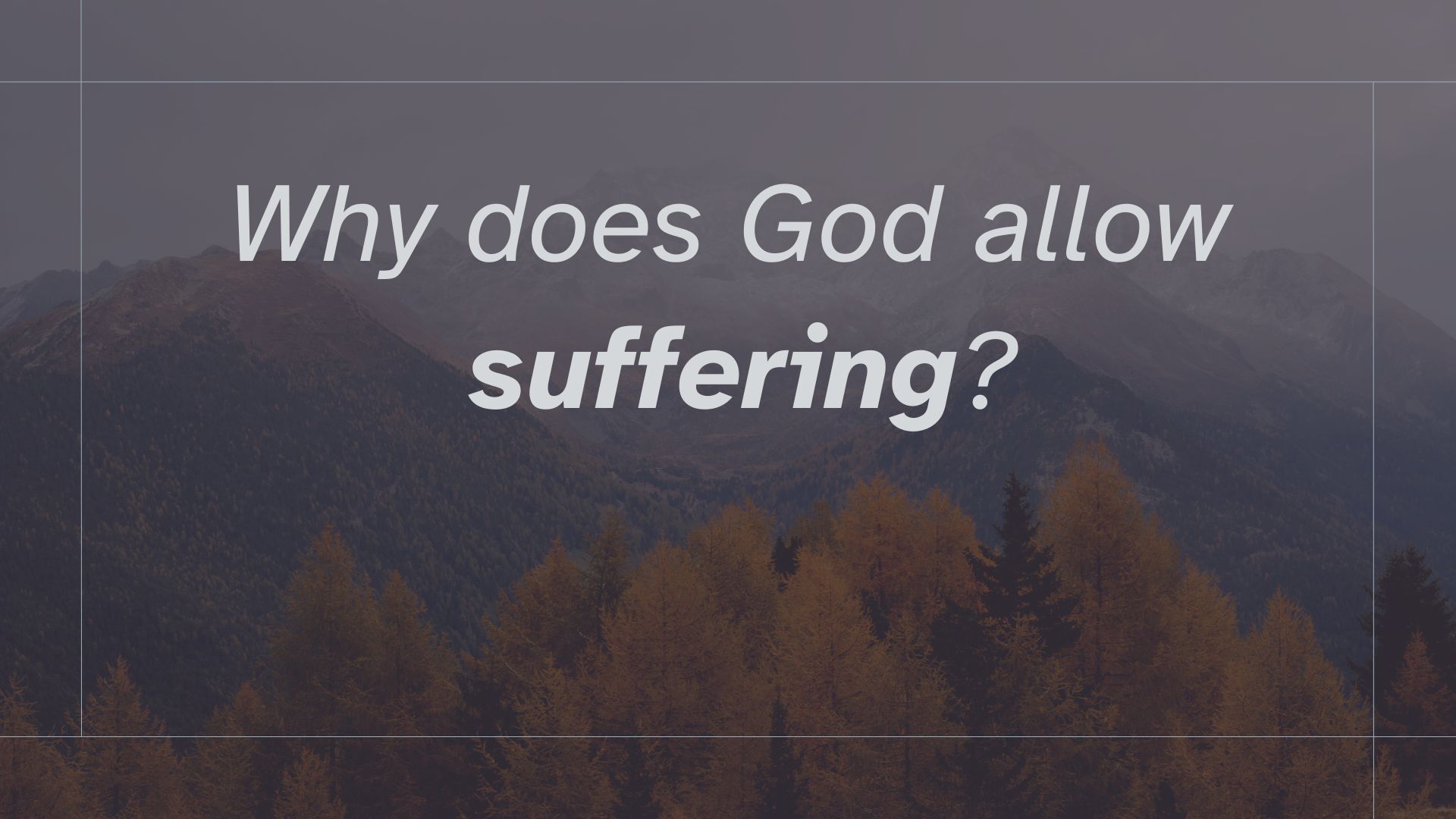I’ll admit, this is one of the hardest questions to answer: Why does God allow suffering?
It seems so contradictory. “If God is all loving, and He is all powerful, then why does He allow evil to exist? And for people to suffer?”
You may have heard a challenge like this from someone who doesn’t share your worldview. This is one of the biggest objections people raise to the Christian faith, what you may hear described as “the problem of evil.” Because, from our vantage point, it doesn’t seem to make sense.
But there’s something else we must consider. If you also believe that God is all-knowing, in addition to be loving and powerful, then you must acknowledge that He knows things we do not.
This is key to wrestling with this question. While things may not make sense to our finite minds, they are no mystery to the One with an infinite mind.
Nothing escapes His notice; we know that from Scripture (Matt. 10: 29). So, you can be assured that God sees your circumstance. He also sees beyond what you can. Because He is loving, He is powerful, and He is wise, He can use whatever circumstance for your good AND the good of someone else.
One of the hardest books to read is the Old Testament book of Job. The devil sought to inflict unimaginable pain and suffering upon Job, and God allowed him to do it.
Why?
If you read the entire book, you may not find the answer you want, because God does not tell Job why. He answered by telling Job who He is. And the very clear message is that He is to be trusted, because of who He is.
We know that what the enemy tried to get Job to do – to curse his Creator – Job did not do. Instead of the story ending with Job in the misery he suffered, it says, “The Lord blessed the latter part of Job’s life more than the former part.”
Tim Keller, in his book “Walking With God Through Pain and Suffering,” said that God often turns evil in on itself. The damage it tries to inflict only damages itself, and results in greater good.
Let me pause for a moment.
If you are walking through a dark season right now, the emotion may be so raw that none of this makes any difference to you. You may be angry and bitter and want relief. All you want to do is yell and to demand an answer.
I’ve been there, too.
Let me encourage you with this. God is big enough to handle your questions. He understands. You won’t surprise Him.
Just hold to the knowledge that He loves you. And someone who loves you enough to send His Son to die for you will not do you wrong.
It all belongs to Him.
There’s another aspect to the story of Job that I missed the first time I read it. But it was ultimately key for my healing after my season of pain and loss.
The book opens with a description of Job. That he was upright, feared God, and shunned evil. But also that he was very wealthy.
God had blessed him abundantly, and Job knew that.
And when he was at his lowest, he said some of the greatest words ever penned:
“Naked I came from my mother’s womb, and naked I will depart. The Lord gave and the Lord has taken away; may the name of the Lord be praised.”
In the midst of unimaginable suffering, Job recognized that all he had was given Him from God. It was God’s to give, and God’s to take away. And in either case, God was to be praised.
It’s easy for us to think that what we have is our doing. Maybe even that we are owed what we enjoy. But this is not reality.
Mankind is made from the dust of the ground. And to dust we will all one day return. Everything we have, even the next breath in our lungs, is a gift from God.
We have all sinned against a Holy God. What we deserve is eternal separation and punishment.
But praise God that He doesn’t give us what we deserve! He is merciful and compassionate. Slow to anger and abounding in steadfast love and faithfulness.
It is right and fitting for us to lament.
When I recounted to my counselor all I had lost and missed out on, he responded, “You’re looking for Eden. ‘It should have been this way.’ But we live in a fallen world.”
His words have stuck with me to this day.
It’s not how it should have been. The way this world is – it’s not how it was designed to be. The pain and the suffering are real. And they should be lamented.
Even Jesus wept after the death of his friend Lazarus (John 11). The Bible describes Him as a “man of sorrows and acquainted with grief.” (Isa. 53:3)
The Worst Day in History
Keller also points to the worst thing in all of recorded history: the crucifixion of the Son of God. Though He did no wrong, though the world was made through Him, the world would not listen to Him. They put Him to death in the most inhumane way imaginable. All of mankind’s sins were poured out on Him, as He took our place.
It was the worst thing that has ever happened.
And it became the most glorious thing that has ever happened.
God gave evil enough rope to hang itself. Through Christ’s death and resurrection, the power of sin is broken, and mankind can be made right with God.
It will also be the focal point of heavenly worship through eternity.
Then I looked, and I heard around the throne and the living creatures and the elders the voice of many angels, numbering myriads of myriads and thousands of thousands, saying with a loud voice, “Worthy is the Lamb who was slain, to receive power and wealth and wisdom and might and honor and glory and blessing!” (Rev. 5:11-12)
So back to our question, “Why does God allow suffering?” This is quite a long way to say, “We don’t know.” For now. But one day I believe we will.
For now we see through a glass, darkly; but then face to face: now I know in part; but then shall I know even as also I am known. (1 Cor 13:12)
While we may not know why, we have the opportunity to trust the One who does. Whether he reveals it to us or not.
And in the meantime, we know that He does not abandon us in our time of need. Most believers know the great passages of Psalms, like,
The Lord is close to the brokenhearted and saves those who are crushed in spirit. (Ps. 34:18)
And also,
for he has said, “I will never leave you nor forsake you.” (Heb. 13:5b)
Future Hope
One last thought. If this life is all there is, pain and suffering would seem especially cruel. But if you believe the Bible to be true, you know that this life is but a vapor. It is so short. Eternity, however, is a long, long time.
And for those who have been saved, the joys of heaven will far outweigh the hard circumstances of earth.
Paul put it this way:
I consider that our present sufferings are not worth comparing with the glory that will be revealed in us. (Romans 8:18)
Not that the present sufferings aren’t awful. They are. And Paul knew that more than most. But compared with our future home, they aren’t even worth mentioning.
Eternity is a long, long time. While our time on earth is like that of grass (Ps. 103:15-16); it’s here for only a brief moment.
Fellow believer, our sufferings, as much as they hurt, are preparing us for something we can’t even imagine. Being in the presence of the King of kings and Lord of lords.
If you have not put your faith in Jesus, this future is available to you also. Just reach out in humbleness, agreeing with God that you have sinned, turning from that sin, and putting your faith in Jesus to save you. He has paid the debt you owe, and offers you a full pardon.
Resources
There are many solid books on the subject of pain and suffering. My two favorites are:
- Walking with God through Pain and Suffering by Tim Keller
- Suffering is Never for Nothing by Elisabeth Elliot




